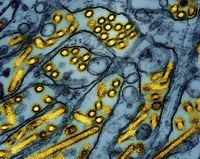On Tuesday, April 8, 2025, the Health Secretariat of Coahuila confirmed the tragic death of a 3-year-old girl due to avian influenza H5N1, marking the first confirmed human infection of this virus in Mexico. The girl had been hospitalized since Friday, April 4, 2025, in the High Specialty Medical Unit No. 71 of the Mexican Social Security Institute (IMSS) located in Torreón. This case has raised significant concerns among health officials and the public alike.
The young girl was originally from Gómez Palacio, Durango, and her infection was first reported by the Sanitary Jurisdiction Number Two in Gómez Palacio on April 4. Following her hospitalization, the girl was treated with oseltamivir, an antiviral medication commonly used for influenza. Unfortunately, despite medical efforts, her condition deteriorated rapidly, leading to multiple organ failure and her eventual death at 01:35 hours on April 8.
Health Secretary Eliud Aguirre Vázquez expressed his condolences, stating, "Today very early we were confirmed of the unfortunate death of the 3-year-old girl, the cause was affected organs during the illness. We have been monitoring closely since her admission, and to date, we have not found any suspected cases." The cause of her infection remains under investigation, and authorities are working to identify how the girl contracted the virus.
Avian influenza H5N1 is a highly pathogenic virus primarily affecting birds but can, in rare instances, be transmitted to humans. The World Health Organization (WHO) has stated that the public health risk from this virus remains low for the general population. However, this unprecedented case in Mexico has prompted health officials to activate epidemiological surveillance protocols in the areas where the infection may have originated.
In response to the confirmed case and the girl's death, health authorities have intensified their efforts to monitor individuals who had contact with her, as well as conducting tests on medical personnel who treated her. Aguirre noted that PCR tests have been performed on the medical staff without finding any suspected cases as of now.
The diagnosis of avian influenza H5N1 was confirmed by the Instituto de Diagnóstico y Referencia Epidemiológicos (InDRE) on April 1, leading to immediate notifications to the WHO and the implementation of preventive measures. These measures include monitoring nearby farms and conducting biological sampling of wild and domestic birds in the vicinity of the girl's home.
Health experts have recommended that the public take precautions, especially when in contact with birds, particularly in rural areas or places with poultry farms. They advise frequent hand washing, wearing masks during dust storms, and seeking immediate medical attention if respiratory symptoms arise.
While this incident has raised alarms, experts emphasize that the risk of human-to-human transmission remains low. They urge the public to maintain hygiene practices and report any unusual cases of illness or death among birds.
As health officials continue to investigate the source of this infection, they are also working to reassure the public about the safety of consuming properly cooked poultry and eggs, which the WHO has stated poses no danger to human health.
The situation highlights the importance of ongoing vigilance and cooperation among health authorities to prevent further infections. This tragic case serves as a reminder of the potential risks posed by zoonotic diseases and underscores the need for effective public health measures.
Despite the gravity of the situation, the Secretary of Health has reiterated that the risk of contagion among humans remains low. The public is encouraged to remain informed and cautious, particularly in areas where avian influenza could pose a threat.
As investigations continue, health authorities remain committed to transparency and rapid action in addressing any emerging public health threats.








